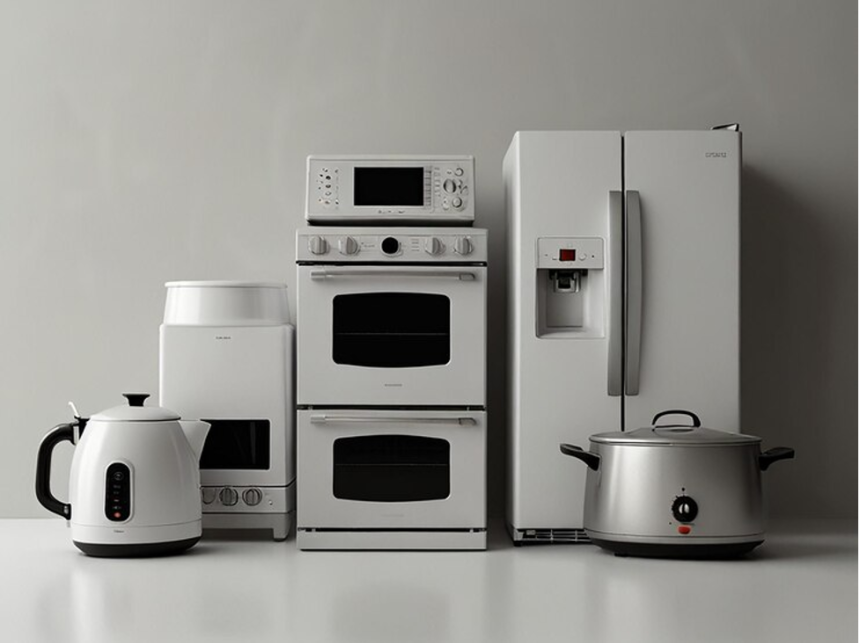Minimalism isn’t just about decluttering your wardrobe or swapping out furniture for sleeker designs—it applies to your appliances, too. If you’ve ever wondered whether you actually need that fancy espresso machine or if your air fryer is just another kitchen fad, you’re not alone.
Some appliances are essential, but others? They might just be taking up space, collecting dust, or draining electricity. Here’s a guide to help you decide what to keep, what to skip, and how to maintain the appliances that truly matter.
1. The Must-Keep: Your Refrigerator
Your refrigerator is non-negotiable—it’s the core of your kitchen. Whether you’re an avid home cook or someone who mostly orders takeout, a reliable fridge keeps your food fresh and prevents waste.
That said, not all refrigerators are created equal. Some models come with unnecessary features like built-in tablet screens or cameras that let you peek inside while grocery shopping. A minimalist approach? Stick to a model that fits your household size, prioritizes energy efficiency, and cools effectively.
If your fridge suddenly stops working, a good repair company like Travis County Appliance can save you from throwing out groceries and shelling out cash for a replacement.
2. The Overrated: A Standalone Freezer
Having a separate freezer might seem useful, but unless you’re meal prepping for a family or buying groceries in bulk, it’s often unnecessary.
Extra freezers take up significant space and consume more energy than you’d expect. Many people fill them with frozen food, only to forget about it for months. If your regular fridge’s freezer compartment meets your needs, that extra appliance is just wasted square footage.
3. The Must-Keep: A Quality Stove (Gas or Electric)
Minimalism doesn’t mean cutting out essential kitchen tools. If you cook, a functional stove and oven combo is a must-have.
A gas stove gives you precise heat control, while an electric stove is easier to clean—but either way, it’s a better investment than relying on smaller appliances like an air fryer or microwave for all your meals.
If your stove starts acting up, a quick repair is usually more cost-effective than replacing the entire unit. Many homeowners mistakenly believe a broken burner means the whole stove is failing, but most issues are fixable.
4. The Unnecessary: Single-Use Kitchen Gadgets
Appliances that serve only one purpose often end up gathering dust in the back of a cabinet.
Panini presses? You can use a regular pan. Popcorn makers? A pot works just fine. Juicers? Messy, hard to clean, and rarely used after the initial excitement fades.
Minimalists focus on multi-functional appliances. If a gadget isn’t pulling its weight, it might be time to let it go.
5. The Must-Keep: A Dependable Washing Machine (And Maybe a Dryer)
A washing machine is a must. Laundromats aren’t practical long-term, and hand-washing every piece of clothing isn’t realistic.
Some minimalists ditch the dryer in favor of air-drying clothes, but if you live in a humid area or value convenience, a dryer is still a worthy investment. If space is limited, consider a stackable washer-dryer combo.
And when your machine malfunctions? Repairs often cost a fraction of a full replacement.
6. The Overrated: A Dishwasher
Dishwashers are a luxury, but they aren’t always necessary—especially if you live alone or don’t use many dishes daily.
Handwashing takes just a few minutes for small households, eliminating the need for an extra appliance. A dishwasher also requires maintenance, regular cleaning, and often leads to higher water and electricity bills.
That said, if you have a large family or entertain guests frequently, keeping a dishwasher makes sense. Otherwise, it might just be taking up valuable kitchen space.
7. The Must-Keep: A Vacuum Cleaner (But Choose Wisely)
Even a minimalist home needs to be cleaned, but the type of vacuum you choose makes all the difference.
For small apartments, a bulky upright vacuum isn’t necessary. Instead, a lightweight stick vacuum or even a handheld model can get the job done. If you prefer hands-off cleaning, a robotic vacuum may be worth the investment—but only if it genuinely saves you time.
8. The Unnecessary: The Clothes Iron
Unless you wear formal clothes daily, an iron and ironing board might be a waste of space.
A garment steamer or even tossing wrinkled clothes in the dryer for a few minutes can achieve similar results. If you haven’t used your iron in months, ask yourself: Do you really need it?
9. The Must-Keep: A Coffee Maker
If coffee is a part of your daily routine, having a coffee maker is probably worth it.
However, if you only drink coffee occasionally, a French press or pour-over setup takes up far less space than a bulky espresso machine or a Keurig.
Minimalism is about being intentional with what you own—so if your coffee machine is just collecting dust, it might be time to part ways.
10. The Unnecessary: Extra TVs in the Kitchen or Bedroom
Many people install televisions in multiple rooms, but in a minimalist setup, extra TVs often add more clutter than value.
A single well-placed TV in a shared space can be enough for most households. Instead of buying multiple screens, investing in a high-quality primary TV setup saves both money and space.
Quality Over Quantity
Minimalism isn’t about getting rid of everything—it’s about keeping only what truly adds value to your life. The key is to choose durable, multi-functional appliances and maintain them well.
And when something does break? Repairing a well-made appliance is usually the smarter financial move over replacing it outright.
By applying a minimalist mindset to your appliances, you’ll save space, money, and energy—without sacrificing convenience.
Lynn Martelli is an editor at Readability. She received her MFA in Creative Writing from Antioch University and has worked as an editor for over 10 years. Lynn has edited a wide variety of books, including fiction, non-fiction, memoirs, and more. In her free time, Lynn enjoys reading, writing, and spending time with her family and friends.















